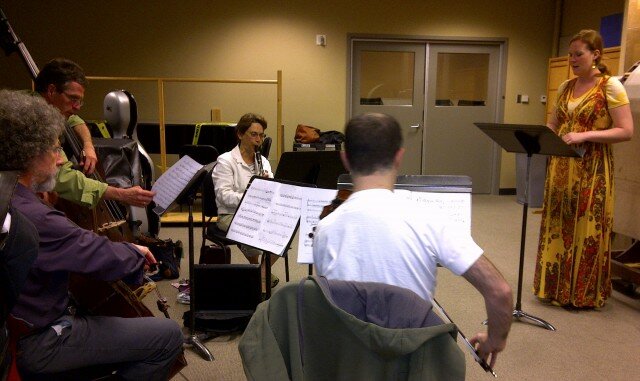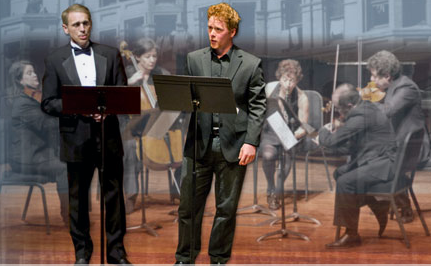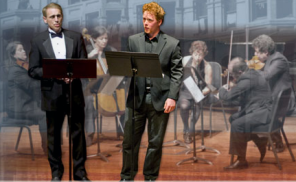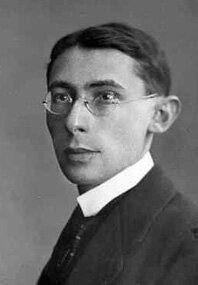
“I love coming back to Seattle and Music of Remembrance,” declares composer Jake
Heggie, his words endorsed by librettist Gene Scheer. These two men, up to their eyebrows in prestigious commissions (an opera each, one for Dallas, one for San Francisco, a symphony and chamber music for Heggie, plus more), can’t say enough in praise of Music of Remembrance, its founding director Mina Miller, and its musicians.
They are here for the premiere at MOR of their latest work, Another Sunrise, on Monday May 14 at Benaroya Hall.
“It’s so important for us that the work that we do is meaningful. Every program with Mina and MOR teaches me something informative, educational, and enriching before I even put pen to paper. Every time I come to Music of Remembrance, I come away a better person,” he says.
The mission of Music of Remembrance, now in its 14th season, is to remember Holocaust musicians, poets, and artists through musical performances, educational programs, musical recordings, and commissions of new works, in two concerts a year held at times meaningful to Holocaust survivors, plus a series of smaller, free performances, and a lot of educational outreach.
“It starts with Mina,” says Scheer. (The two men, who have worked closely together on a number of works, the most recent for MOR being the 2007 music drama For a Look or a Touch, speak in tune with one another, their thoughts in parallel.) “She has a visionary, passionate intelligence which yields incredible results. She’s one of the most articulate people I know. She has enthusiasm, generosity, and a conviction that these stories must be told.
“She looks for an unusual angle with which to approach the material,” says Heggie. “She wants a fresh perspective, how the past lives in present memory.”
“It begins with what happened and how does one remember,” says Scheer. ”How do we tell this narrative and makes sense of those lives?”
The process for Another Sunrise began when Miller asked the two men what they would like to write about for MOR. As they hashed out ideas, what came to the fore was the question of what survivors feel, the burden of their memories.
“Who knows what we are capable of when there is a gun to our heads?” queries Scheer, “so, we came up with the nature of survival.”
At this point Miller found, and gave them to read, two books written by one of those Holocaust survivors, Krystyna Zywulska. As they learned more about this woman, her story seemed to fill the bill. “She had to do things to survive which haunted her the rest of her life,” says Heggie. (Miller was able to find Zywulska’s son, Tadeusz Andrzejewski, and he has come from Paris for the premiere Monday and will speak about his mother.)
And then, Scheer found an interview Zywulska gave in Poland to a political science professor for a book on survival memories.
“I sensed that her responses could be the fulcrum for this piece,” says Scheer. “Her frustration with what she could not put into words, that she couldn’t describe,” an ironic situation, as Zywulska had survived Auschwitz-Birkenau through writing satirical lyrics set to popular tunes, and later made a careeer writing lyrics for pop songs.
She had no answers that she found truly satisfactory to how she survived in Auschwitz. Heggie and Scheer came up with an approach to Zywulska’s story which is fictional in format but true to the story Zywulska tells in her autobiographies.
“We thought, What if the professor had given her a tape recorder, to tell that what she could when the words came to her, and that became the dramatic device we created,” says Scheer. “She wakes in the middle of the night and can’t sleep. This is years later, and she’s haunted by things she couldn’t say, a melody she hums and can’t find the words to. She turns on the machine—and turns it off. What does she want to leave for posterity? As she talks she defines herself, only she can’t find the words.”
“So what can’t be described in words, can be described in music,” says Heggie. “My job is to empathize deeply with the character, only she’s not just a character, she’s a real person. I needed to get into her heart, to the very purest part, and just feel and respond, as a musical soul. She’s on an emotional rollercoaster. It’s a dark night of the soul. She’s trying to make sure others don’t go through what she went through.”
Says Gene, “We are both after the same thing, the storytelling. If I’m doing my job right, I’m building the scaffolding for the musical landscape being depicted on stage. It’s not that the words would fade away, we want people to take away the emotional experience.” One singer, a chamber ensemble, and minimal staging make up the dramatic scene for Another Sunrise.
For the solo role, Heggie and Scheer chose soprano Caitlin Lynch, a graduate of Seattle Opera Young Artist program who sang Micaela in Seattle Opera’s most recent Carmen, an intelligent, sensitive artist with the technique and voice to match. “She even looks like Krystyna,” comments Heggie.
Lastly, he says, “This is a work of art, it’s not a documentary. What we are after is her emotional life, something that resonates as true.”
“Everything described here is true,” says Scheer, “but in language I created, though there are two or three quotes I took from her interview.”


